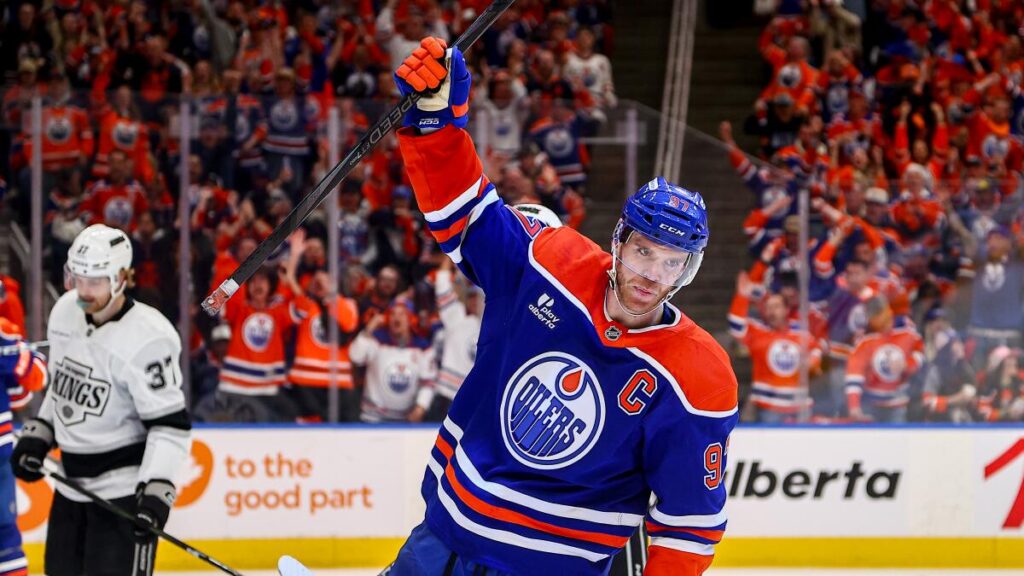
EDMONTON, AB - APRIL 27: Edmonton Oilers Center Connor McDavid (97) celebrates a goal in the third period of the Stanley Cup Playoffs First Round Edmonton Oilers game versus the Los Angeles Kings on April 27, 2025 at Rogers Place in Edmonton, AB. (Photo by Curtis Comeau/Icon Sportswear)
In a heartbreaking Game 4 overtime loss, the Kings are unable to halt another Oilers rally.
The Stanley Cup Playoffs are a crucible where the smallest mistakes are magnified, and resilience is a prerequisite. On Sunday night, the Los Angeles Kings found themselves yet again on the wrong end of an Edmonton Oilers comeback, falling 5-4 in a gut-wrenching overtime loss in Game 4 at Crypto.com Arena. In a series that has been defined by volatility, missed opportunities, and momentum swings, the Kings’ inability to close out games has become a glaring problem—one that now threatens to derail their entire postseason.
If there was one word that defined the Kings’ Game 4 performance, it would be “control”—control they had and control they lost.
Through two periods, the Kings looked like the more composed and opportunistic team. Despite being outshot early, Los Angeles capitalized on Edmonton’s defensive lapses and questionable goaltending to carve out a 3-1 lead. Adrian Kempe was electric, scoring a dazzling goal midway through the first period and assisting on another by Kevin Fiala in the second. Anze Kopitar, the Kings’ perennial leader, dominated the faceoff circle and managed possession as if he were willing the series back into Los Angeles’ hands.
But hockey is a cruel game when control is mistaken for comfort. The Oilers—led, of course, by the dynamic duo of Connor McDavid and Leon Draisaitl—kept pushing. Slowly. Methodically. As the third period began, the signs were there: small breakdowns in the neutral zone, hesitant clears, lost battles along the boards. By the 10-minute mark, the tide had fully turned.
Edmonton scored twice within a furious three-minute stretch to knot the game at 3-3. Suddenly, the Kings’ sure hands became jittery. Passes missed their marks. Defensive assignments were blown. Even goaltender Cam Talbot, so reliable early on, looked rattled as he fought off a flurry of point-blank chances.
When Quinton Byfield gave the Kings a 4-3 lead with just under five minutes remaining, it felt like a breath of fresh air—a possible reprieve. The building shook with noise. All Los Angeles had to do was hold.
But holding is not what the Kings do best these days.
With the Oilers pulling their goaltender for an extra attacker, Draisaitl pounced on a loose puck in the crease and buried the game-tying goal with 1:12 left in regulation. Another lead, another slip through trembling fingers.
In overtime, the Oilers needed just 2:47 to complete the comeback. Evan Bouchard, whose booming shot has haunted the Kings all series, rifled a power-play goal past Talbot to end it. Just like that, Edmonton took a 3-1 stranglehold in the series, and the Kings walked off the ice, stunned, broken, and facing elimination.
In many ways, the story of the Kings’ postseason run has been one of painful lessons. Two years ago, they pushed the Oilers to seven games in a thrilling first-round matchup before bowing out. Last season, they again failed to exorcise the Edmonton demon. Now, they are staring at an eerily familiar fate—and it stings even worse because the margins feel thinner than ever.
“This one hurts,” admitted Kings head coach Jim Hiller in the postgame presser. “We had them. We did a lot of things right. But against a team like that, one or two mistakes, and they make you pay every time.”
Hiller’s assessment is blunt but accurate. The Kings are not being overwhelmed by superior play for 60 minutes; they are being undone by collapses at critical junctures. Their puck management, especially late in games, has been poor. Their discipline, especially against Edmonton’s lethal power play, has been suspect. And perhaps most damning, their mental toughness under pressure has looked increasingly fragile.
“You have to learn how to close,” Kopitar said, visibly frustrated. “You have to learn how to finish when you’re ahead. Otherwise, this is what happens.”
While the Kings wrestle with their demons, it’s impossible not to tip your cap to what the Oilers have done—specifically what McDavid and Draisaitl have done.
McDavid was relatively quiet by his standards, registering only two assists, but his presence was constant, his speed warping the Kings’ defensive structure every time he touched the puck. Draisaitl, meanwhile, continued to play the role of King slayer, scoring twice and assisting once. He now has a staggering 10 points in the series.
Adding to the Kings’ misery was Bouchard’s emergence as an elite weapon from the point. His overtime winner was his second goal of the playoffs and showcased why Edmonton’s power play, clicking at nearly 40 percent, is the most feared unit in the league.
“They’re relentless,” said Kings defenseman Drew Doughty. “They never think they’re out of it. They just keep coming.”
That relentlessness has exposed the Kings’ Achilles’ heel: an inability to match urgency with execution when it matters most.
Another uncomfortable truth for the Kings is that their goaltending situation, stable during the regular season, has crumbled under playoff pressure.
Talbot, while admirable in stretches, has not been the answer against Edmonton’s wave of elite shooters. His .886 save percentage in the series reflects not just the quality of chances he’s faced but also some inexcusable rebounds and mistimed plays. There’s an argument to be made that backup David Rittich could see time if the series extends to a Game 6, but that feels more like desperation than a solution.
Moreover, the Kings’ blue line has been exposed repeatedly. Matt Roy and Mikey Anderson have struggled with turnovers. Even Doughty, typically a rock in the postseason, has looked a step slow at times against Edmonton’s blazing attack. Without a clear defensive stopper and with penalty killing in free fall, the Kings have no clear answers heading into Game 5.
Yet all is not lost—at least not mathematically.
The Kings still have life. They still have Kopitar, Kempe, Fiala, and a group that, when playing to their strengths, can stifle opponents and generate high-danger chances. They have shown they can score on Edmonton’s less-than-stellar goaltending tandem of Stuart Skinner and Calvin Pickard.
But the margin for error is now razor-thin. One more mistake, one more blown lead, and the Kings’ season will be over.
“We’re not going to quit,” said Kempe after the game. “We’ve got to find a way to get one in Edmonton and bring it back here. That’s all we’re thinking about.”
Finding a way means recommitting to structure. It means smart, simple plays in the defensive zone. It means staying out of the penalty box and resisting the urge to trade chances with a team built for chaos.
Most importantly, it means rediscovering belief—not in a miracle comeback, but in the habits and hard work that brought them to the playoffs in the first place.
Game 5 shifts back to Edmonton’s raucous Rogers Place, where the Oilers will be looking to slam the door. The Kings must overcome not just the odds but their own growing self-doubt to stay alive.
“We’ve been through a lot together,” Doughty said. “This group has character. We know what it takes. We just have to go out and do it.”
It’s a simple message, but one that must be backed by action.
Otherwise, the Kings’ 2024 playoff story will become yet another cautionary tale of promise undone by heartbreak—and another long summer filled with what-ifs.





